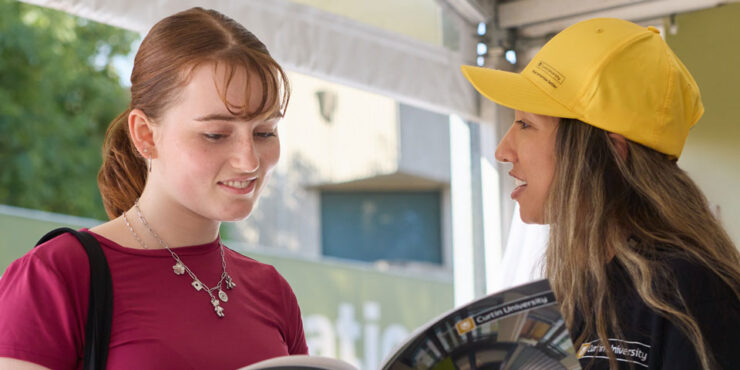Course overview
Guide students through adolescence and prepare them for a successful life ahead.
This initial teacher education degree prepares you for a rewarding career in secondary school teaching and enables you to pursue specialist interests. You will develop the critical knowledge and skills of best practice in education to meet the needs of 21st-century learners.
Career outcomes
Careers
- Secondary school teacher
- Policy development officer
- Special programs officer
- Trainer, mentor or coach
- Curriculum designer
Industries
- Education (government and non-government)
- Training
Professional accreditation and recognition
This course is accredited in Western Australia by the Teacher Registration Board of Western Australia.
Why study at Curtin?
Teachers are in-demand
There is a nation wide shortage of teachers, presenting you with strong job opportunities (Job and Skills Australia, Occupation Shortage List 2024)
Work experience
You will undertake 18 weeks of teaching practice, which includes a 10-week internship where you will be responsible for students’ learning, under the mentorship of a qualified teacher.
Professional recognition
This course is recognised by the Teacher Registration Board of Western Australia and countries that recognise Australian teaching qualifications.
Your student experience

Work-integrated learning at Curtin: explore a Universe of opportunity
Develop real-world experience before you graduate. Learn how work-integrated learning helps you build career skills and connect with industry early.

Thinking about uni? Five reasons Curtin could be your best move
Not sure if uni is for you? Explore five clear reasons students choose Curtin – from flexible pathways and support to real-world skills and outcomes.

Find your entry pathway to Curtin
You may be finishing high school, coming from TAFE, or just thinking of a career change; but whatever your background, there’s an entry pathway to Curtin for you.
Upcoming events

29 March 2026
Curtin Open Day
Curtin Perth
Discover where in the world a Curtin Degree can take you at Curtin Open Day. Explore courses that connect with industry, meet people who can guide your career direction and see how your ideas can become a reality.
Course structure
What you’ll learn
You can specialise in one or two curriculum areas, gaining specialist discipline knowledge and units that develop your pedagogical knowledge.
You’ll also study units that establish your understanding of teaching practice, such as educational psychology, Indigenous education, and teaching students with diverse learning needs.
All units are mapped to the Australian Professional Standards for Teachers, ensuring you graduate with the relevant competencies required to teach successfully.
Throughout your studies, you will build a professional digital portfolio that showcases your teaching abilities to potential employers.
Teaching placements
During your studies, you will complete four professional placements in schools. Totalling 720 hours of supervised teaching practice, these placements are undertaken in full-time blocks, regardless of your study mode. You may be able to undertake a rural, interstate or overseas placement.
Your supervised teaching practice will comprise:
- a two-week full-time block in the first year of your course
- a three-week full-time block in the second year of your course
- a three-week full-time block in the third year of your course
- a block of one full school term (typically 10 weeks) in the fourth year of your course.
Detailed course structure and unit information
For detailed information and course structure, visit our Handbook.
Customise your degree
Customise your degree by first choosing the major you want to specialise in, and then selecting from two options to complete your degree structure.
Your major prepares you with the content and pedagogical knowledge you need to teach across your chosen curriculum area from years 7 to 12, as well as in your specialist subject area in years 11 and 12.
You will choose your major when you apply for the course (you won't need to complete your degree structure until after you've accepted your offer and enrolled).
Note that your choice of units will depend on your Education major.
Step 1: Choose your major
Choose from:
- English
- Humanities and Social Sciences (HASS) (Geography)
- HASS (History)
- HASS (Economics)
- HASS (Politics and Law)
- Physical Education
- Mathematics
- Science (Biology)
- Science (Chemistry)
- Science (Human Biology)
- Science (Psychology)
- Science (Physics)
- The Arts (Drama)
- The Arts (Media Production and Analysis)
- The Arts (Visual Arts)
Step 2: Complete your degree structure
Complement your major with one of the three options below. This step happens after you accept Curtin’s offer for your chosen major, however your choice of second specialisation is dependent upon the education major you select.
Refer to the specific majors for more information about available second specialisations.
Option 1: Choose a minor teaching area
Expand your scope as an educator by supplementing your major teaching area with a minor teaching area.
Option 2: Extend your major teaching area
Broaden your understanding of your specialist subject area by studying additional discipline-specific units. You will also extend your curriculum and pedagogical knowledge of your major.
Entry requirements
To study this course, you must meet the entry criteria:
- course ATAR, or equivalent, demonstrated via an accepted entry pathway
- any course-specific requirements
- English language requirement.
Guaranteed entry
If you achieve the guaranteed ATAR/selection rank for this course and meet all other entry requirements, you’re guaranteed a place in this course.
Entry pathways
There are different ways to meet our academic entry requirements. Choose the option that best suits the highest level of education that you’ve achieved.
Curious how students entered this course? See the entry pathways other students have taken.
Course-specific requirements
You’ll also need to meet any specific requirements to be eligible to apply for this course.
Study credit and support
You may be able to receive study credit or support based on your previous experience or personal circumstances.
Get credit towards your degree
You may be able to receive credit for recognised learning (CRL) from past study or professional experience, which could reduce the time it takes to finish your course.
Find specific details about CRL for this course on the Handbook.
Special consideration
If your studies were affected by circumstances beyond your control, you may be eligible for special consideration when applying to Curtin. This process is available to new applicants only and allows your application to be assessed in light of those circumstances.
Additional information
Application Requirements
Please refer to our application requirements before applying for this Curtin course.
Notes about this course
Make sure you check the course notes for any other important information.
Fees
2026 Domestic indicative fees
*The indicative first-year fee is based on a standard full-time study load of 200 credit points.
This fee is a guide only. Your total fee may vary depending on the units you choose, your study load or if your course includes additional requirements. For more information on fees, see other fees and charges.
Scholarships
Get the support you need to succeed with our diverse range of scholarships. Whether it’s financial support, assistance with relocation, or recognition for your academic achievements, we have scholarships tailored to your unique needs.
How to apply
Follow these steps to make sure you’re eligible, prepared and ready to apply for your course.
Check entry requirements
Entry requirements differ by course and your previous work and study experience.
Prepare your documents
The documents you need may vary depending on your course and application pathway.
Check application deadlines
Deadlines vary by course and whether you’re applying as a domestic or international student.
Choose your application pathway
I’m in year 12 or applying for Medicine
If you’re in year 12 or recently finished high school, you’ll need to apply through TISC.
You’ll apply through TISC no matter what you studied in high school, whether that was:
- ATAR
- General subjects
- Certificate IV
- or completing UniReady in Schools program.
TISC has different application dates to Curtin. Visit the TISC website for all important dates, including application deadlines.
I have finished high school
If you’re not a current year 12 student or recent graduate, you’re considered a non school leaver and you’ll apply directly to Curtin.
The only exception is Medicine, which must be applied for through TISC.
You’ll apply directly to Curtin if you are:
- a high school graduate who finished school last year or earlier
- transferring from another university
- returning to study or using your professional experience to qualify
- progressing from a VET or TAFE qualification or bridging program
- a current Curtin student changing courses or campuses.
Application deadlines can vary by course. Make sure to check application deadlines before you apply.
Express your interestExplore more
Find more resources to help you take the next step in your Curtin journey.